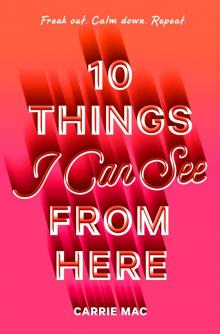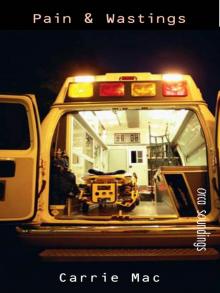- Home
- Carrie Mac
10 Things I Can See from Here
10 Things I Can See from Here Read online
THIS IS A BORZOI BOOK PUBLISHED BY ALFRED A. KNOPF
This is a work of fiction. Names, characters, places, and incidents either are the product of the author’s imagination or are used fictitiously. Any resemblance to actual persons, living or dead, events, or locales is entirely coincidental.
Text copyright © 2017 by Carrie Mac
Cover art copyright © 2017 by Steven Wilson
All rights reserved. Published in the United States by Alfred A. Knopf, an imprint of Random House Children’s Books, a division of Penguin Random House LLC, New York.
Knopf, Borzoi Books, and the colophon are registered trademarks of Penguin Random House LLC.
Visit us on the Web! randomhouseteens.com
Educators and librarians, for a variety of teaching tools, visit us at RHTeachersLibrarians.com
Library of Congress Cataloging-in-Publication Data
Names: Mac, Carrie, author.
Title: 10 things I can see from here / Carrie Mac.
Other titles: Ten things I can see from here
Description: First edition. | New York : Alfred A. Knopf, [2017] | Summary: Maeve, a sufferer of severe anxiety, moves in with her recovering alcoholic father and her very pregnant stepmother and falls for a girl who is not afraid of anything.
Identifiers: LCCN 2015046690 (print) | LCCN 2016024868 (ebook) | ISBN 978-0-399-55625-8 (trade) | ISBN 978-0-399-55626-5 (lib. bdg.) | ISBN 978-0-399-55627-2 (ebook)
Subjects: | CYAC: Anxiety disorders—Fiction. | Fathers and daughters—Fiction. | Love—Fiction. | Lesbians—Fiction.
Classification: LCC PZ7.M111845 Aam 2017 (print) | LCC PZ7.M111845 (ebook) | DDC [Fic]—dc23
Ebook ISBN 9780399556272
Random House Children’s Books supports the First Amendment and celebrates the right to read.
v4.1
ep
Contents
Cover
Title Page
Copyright
Dedication
Epigraph
Stupid Things People Say
Being Hit by a Train
Decapitation
Being Home Alone
Distracted Drivers
Apartment Buildings
Used Furniture
Keep Calm and Carry On
Raymond’s Penis
King Percival
Birth
Maybe
Distraction
Not Finding the Girl You Are Looking For
Grandma
Broken Bones
Parental Marital Tension
Bumping into People
Gut Instinct
Dead Bodies
Killing Someone
Parents Arguing
What Happens After You Die
Little Kids and the Subject of Death
Dead People’s Empty Houses
Funerals and Fathers
Missing Ruthie
Surprises
Jessica
Dates
Humiliation
Ruthie
New Neighbors and Drunk Dads
Running Away
Forgetting About Someone You Love
Braxton Hicks
All the Beautiful People
Pretending
Heights
Bad Drummers
Dad
Riding a Bike
Letting Go
Confrontation
Saying the Hard Stuff Out Loud
A Girl in My Bed
Avoidance
What Happened with Ruthie
Girlfriends and Parents
Performance Anxiety
Birth
Night Swimming
Acknowledgments
For Esmé, with love and love and love
Oh you delicate heart.
Sometimes it feels hard to live.
—Hawksley Workman
You are not your anxiety.
Don’t worry your pretty little head.
It doesn’t matter.
Don’t exaggerate.
Why get upset about something so small?
Just put it out of your mind.
All good things. All good things.
Ignore it.
Let go and let God.
Think positive.
Move on.
Get back on the horse.
What’s the matter, honey?
If you visualize good things, good things will happen.
Manifest destiny, Maeve. Make it happen.
You be the master of your life. Take charge!
Don’t underestimate the power of positive thinking.
Keep calm and carry on.
Don’t worry; be happy.
What is there to worry about?
All the things.
I could easily admit that it was nicer and faster to take the train from Seattle to Vancouver. But the last time I took the train, a woman threw herself in front of it just outside Everett. None of us had any idea what was happening while the train dragged the woman along until it finally screeched to a stop, spreading out her brains and entrails on the tracks. Which I knew because I researched these things. Her name was Carol Epperly. Thirty-six years old. Mother of two. Struggled with depression. No kidding. I read her obituary (of course), and it sounded like someone really angry wrote it. I’m guessing it was her husband, and if so, he was pissed. His name was Doug. He had a lawn-mower repair shop in Everett. She struggled against the depression, but clearly not hard enough. That’s what it said. And at the end: Never mind a charity; please consider donating to a fund for the boys, who will only know life without their mother from now on.
I would not be taking the train again anytime soon. That one moment was all I talked about with my therapist for almost three months straight. Nancy actually told me that it was time to move on. She had never said that before. That was like admitting defeat. That was like saying I had stumped her. She had never once offered a platitude before that.
So I took the bus, which I’d taken often enough to admit that it wasn’t the worst thing, even if it was slower. Mom drove me from Port Townsend to Seattle. I started crying before the stop sign at the bottom of our road.
“Oh, Maeve, sweetheart.” She drove with her hand on my knee. “It will be okay. I know it.”
There wasn’t anything for me to say. I’d already said everything. So I cried. The mountain of tissues in my lap grew tall and teetering. I was still crying as Mom looked for a parking spot at the bus station.
I cried while she bought my ticket. I cried and cried and cried when it was time to go.
“I love you,” Mom said.
“I love you.” But I didn’t say goodbye, and neither did she. We never said goodbye when I went to Dad’s. It was our superstition. Or mine, and she just played along. No goodbyes. Especially this time.
Nancy had told me that I should take the train again so that I would realize that people don’t throw themselves in front of trains all that often. This is your horse, Nancy said. Get back on it, Maeve. Besides, Nancy told me, it was far more likely that my bus would get into a terrible crash than that another person would commit suicide by train. Which was not helpful in the least. But I just couldn’t do it. I just could not get back on the train. Not yet. Not after Carol Epperly.
You could always walk, Dad had said. Which would be kind of epic. It could be a whole coming-of-age spiritual experience happening right along the I-5. Imagine that.
I didn’t want to do the train, or the bus, or walk. And there was no excuse to fly, considering how close it was, for one thing, and the litany of possible air disasters, for another. I just wanted to stay home. But that was not an option either. You’re too nervous, Mom said. Imagin
e being alone at night. You’d just sit there trembling and anxious, which you do even when I’m home. And it was true. I worried and worried and worried until I was sick. But she was going to Haiti, so I was going to Dad’s. For six months.
The wait at the border took extra long because some guy didn’t have the right papers, and they took him into a room and questioned him for half an hour while the rest of the passengers just stood around wondering what the hell was going on and I chewed my nails and thought too hard. Were they interrogating him? Was he a terrorist? Or wanted by the FBI?
He looked pretty sheepish when he came out. Everybody else looked royally annoyed. Not me, though. I’d made the mistake of surfing the internet to distract myself from the potential serial killer in the little room, and because I couldn’t help myself, I’d looked up Greyhound bus deaths.
Decapitation!
On a Greyhound bus!
July 30, 2008. Vince Li sat down beside Tim McLean, who barely noticed him before he fell back to sleep. A little while later, Li pulled out a knife and stabbed him. Screaming, blood everywhere, the other passengers scrambling over each other to get out. While everybody else fled for safety, Li sawed off Tim’s head. Then he paraded the severed head up and down the aisle, and when he was done, he went back to his seat and sliced off some of Tim’s flesh and ate it.
And so that was what I worried about all the way from the border to the bus station in Vancouver. I watched my fellow passengers very carefully. Especially the guy who’d been held at the border for so long. He had shifty eyes. And he kept his suitcase with him, instead of putting it under the bus. He could’ve had a hunting knife in there. There were no laws against crossing the border with a hunting knife. Or a box cutter. Or a blowtorch. Or a hammer. A person could do a lot of damage with a hammer. There have been an inordinate number of murders involving hammers.
—
Finally the bus wheezed into the station, and everyone filed out with their heads still attached to their bodies, including me. When I stepped off the bus, I heard violin music playing. It sounded familiar, and while I waited for my suitcase, I listened carefully, trying to ignore all the other city noise. Focus on the music, Maeve. Focus on the music.
Which worked for about a minute.
Because who was to say that I hadn’t escaped decapitation only to fall victim to some other gruesome death? Awful things happened all the time in big cities. The statistics backed me up on this one. Big crimes happened in cities. People got away with things in big cities. So many people, and so much busyness, and everyone bustling around doing their own thing, and no one knew each other and nobody cared. That was how people got killed. That was how people got murdered.
To further boost the likelihood of catastrophe, Vancouver’s bus station was located smack-dab in the worst neighborhood. Vancouver actually had a task force to deal with the amount of human excrement that ended up on the sidewalks and in the alleys around there. There were more hookers than kids in the neighborhood. At the Ivanhoe Pub across the street, a person could buy a drink, or sex, or stolen cheese or stolen jeans or a stolen car or a stolen child.
I wished that Dad lived in a nice little town like Port Townsend. Actually, I wished he lived in Port Townsend in particular. Not in Vancouver, where fifty-two women had disappeared from this very neighborhood, with the DNA of half of them ending up in the mud and pig shit at a farm just outside the city. The murderer had gone to prison in 2002, but he still scared the crap out of me. Also, I didn’t think he’d worked alone. I thought his brother was just as guilty. He was still out there.
—
This was what happened when I had to wait. My mind raced. It got ugly. Fast.
In about the time it took me to eat a bag of chips, I could go from thinking about what song to listen to next to imagining what it would be like to have my head sawed off by a madman.
Tim McLean had no idea it was coming. He was just sitting there, asleep, and then one slice, and then pain and blood and screaming—
I stopped in my tracks so abruptly that my suitcase bumped me from behind. My heart galloped in place. I had to find Dad before it got worse.
Inside the bus station were two rows of wooden benches where Dad usually waited for me. He wasn’t there. I checked the coffee shop. The newsstand. The little kiosk that sold international phone cards. I checked the parking lot.
It was getting dark, and the lights of the city sparkled. The air was warm. It stank of piss and exhaust and hot city garbage. And the music again. A girl at the edge of the park, her eyes closed as she played. She slid the bow across the strings as if the violin weren’t there at all. I recognized the song. Coldplay. “Clocks.” She was good. And she was cute. Very cute. A man cut in front of her, hunched over, his face twisted as he argued with someone who no one else could see. The girl didn’t even look up. She just kept playing.
If I had been a different person—say, a normal one—I’d have gone over there and listened and put some money in her violin case and asked an interesting question. Make an observation, Nancy would say. And then ask a specific question. But there was too much out there. Cars and buses and taxis. Horns honking. A siren. The SkyTrain slicing along overhead. A one-legged bum begging for change, two girls in stilettos arguing, a guy puking against the wall, and an old woman organizing her shopping cart. And the small, grassy park where that girl had just barely escaped being shoved into a cargo van the week before.
The music stopped. I looked across to the park. She was having a drink of water, her head tipped back. Flip-flops, tan legs, cargo shorts, a leather belt with stars stamped into it, a black T-shirt tight around muscular, tanned arms, a silver necklace with a ruby pendant, a jumble of cuffs and friendship bracelets on one wrist, short auburn hair.
Dad’s truck wasn’t out there.
How about some more dead women? In that same park there were fourteen pink granite benches arranged in a circle. A memorial to the girls who’d been murdered in their college classroom by a wacko with a gun and a manifesto. One bench for each girl.
The girl started playing again, and I thought, If I were her, I’d pick a better place. A safer place.
Murder happens.
The panic attack slammed into me from the front, as if I were being gored by a bull. I backed against the wall and put my hands on my knees. I took ten deep breaths. Ten really good ones, Nancy said. Nice and deep and even.
I was drenched with sweat. My hands were clammy. It felt like the bull was sitting on my chest. I couldn’t breathe. I wanted to go back inside. I wanted to be where it was safer. Inside, with air conditioning and shops and people wearing clean clothes and talking to other real people.
Honking horns. Screeching tires. Sirens coming from all directions. The air thinned and got hotter and the lights were too bright and the dark was too heavy and I still couldn’t breathe. I couldn’t be out there for one more second, but I couldn’t move, either. Focus on the violin music. Soft and sweet and totally out of place amongst the grime and the crazies. The girl with the violin. Look at the girl.
She was playing with her eyes closed again. Totally oblivious. Stupid and naive. How many times had someone stolen her busking money right out of her violin case? How many times had she avoided something much worse?
Move, Maeve.
Move.
One foot. The other foot. Through the door. Back inside.
I shivered in the cool air and parked myself on the closest bench. I took out my sketchbook and pencils. Art as therapy, Nancy said. But it wasn’t. It was art as survival. It was one of the only things that could calm me down. I sketched the big old clock high up on the wall. I sketched a woman walking by, holding a toddler by the hand.
Dad knew better.
It never went well when I had to wait. Never, ever.
I sketched the garbage can. A fire extinguisher. The guy behind the counter at the newsstand, until he saw me studying him and gave me the finger.
I called Dad, hoping that
maybe for once he would pick up. But no, his phone went straight to voice mail. Maybe he was at an AA or NA meeting. He always turned his phone off at those. I called his house. No answer. I tried Claire. No answer.
I had to pee, but I wasn’t going to go. One time I found a pool of blood congealing on the bathroom floor. Another time I found two security guards and six firefighters standing over a woman who was splayed on her back on the floor, and two paramedics on their knees at her side. Just step around, honey, a fireman said. Go ahead.
I tried Dad again. Straight to voice mail.
I texted. Where are you? Where are you? Where are you?
And Claire. Where is Dad?!?!?!
And Mom, too.
Dad is late. If I disappear into the murky depths of the Downtown Eastside, know that I never wanted to come here and it will be all your fault. Enjoy the guilt.
I started a text to Ruthie. I’m waiting for my dad at the bus station, and I
Wait. What was I supposed to say to her?
I was thinking about how fucked up that day was
Delete, delete, delete.
I sent Mom another text instead, but she was on a plane to meet Raymond before leaving for Haiti.
Sorry. I love you. I’m fine. Really. I love you. I miss you. I won’t disappear.
No one texted back. Dad had sent about three texts, ever, in his whole life. Claire always had her phone on vibrate because she couldn’t stand any ringtone out of the billion available, which was fine so long as she had her phone in her pocket or could hear it scuttling across a table. Mom was on a plane somewhere over the Rockies, and Ruthie was up in Alaska at a summer camp for science geeks, miles and miles from any cell reception at all, and about as far away from me as she could possibly get.

 Wildfire
Wildfire The Opposite Of Tidy
The Opposite Of Tidy Beckoners
Beckoners 10 Things I Can See from Here
10 Things I Can See from Here The Gryphon Project
The Gryphon Project The Way Back
The Way Back Pain & Wastings
Pain & Wastings